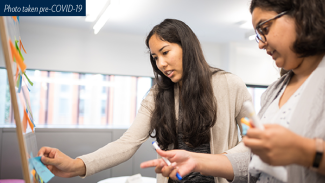Award-Winning Ross Course Showcases Impactful Prototypes to Build Back Better

On Dec. 7, five teams of graduate students from the University of Michigan showcased their project findings at Demo Day for the +Impact Studio’s innovative BA 670 course, whose semester theme was “Building Back Better in the Wake of COVID-19.”
The grad students’ work illustrates the goal of the +Impact Studio — to translate faculty insights into solutions to the world’s most challenging problems. In addition to the action-based learning course, the studio, which is part of the Business+Impact initiative at Ross, serves as a collaboration space and a campus hub for programming and events.
To complete their semester-long projects, the BA 670 students — from the Ross School of Business, School of Public Health, Gerald R. Ford School of Public Policy, and the School of Information — worked closely with a collection of organizations to discover unmet needs and develop solutions for pandemic-related challenges. There was an emphasis on women- and minority-owned small businesses and nonprofit organizations due to the lack of resources available to them.
The student teams worked together virtually on their projects across four continents, nine time zones, and six countries for the duration of the semester. Projects ranged from food insecurity to funding for small businesses. Students were able to choose the projects they worked on at the beginning of the semester.
Katarina (Kat) Chan, MBA ’21, said she enrolled in the +Impact Studio course to flex her business skills and do real impact work while at Ross.
The +Impact Studio course seemed like the most unique course where you get to go deep into design thinking, apply it to real semester-long projects, and truly make an impact. None of the impact projects were specifically related to my career interest, but that’s why I chose to take BA 670. I wanted to try new things and pick up new skills that I know I probably won’t get to do anywhere else after I graduate from Ross. This is what I love about being a MBA student at Ross.
Recap of the +Impact Studio course projects this semester
Health-Informed SpaceComm
Student team: Jenn Weber Krane, MBA ’21;Tory Lowy, MPH/MPP ’21; Esenam Dogoe, MBA ’21
The team was tasked with helping women- and minority-owned small businesses find ways to reduce their customer risk and exposure and also keep their customers informed, engaged, and updated on procedures. Through their research, they found that many businesses lack the resources and capacity to make public health-informed changes to space design and communication campaigns. The students created a playbook of ways for small businesses to communicate their health and safety protocols to customers.
Pop-Up Network
Student team: Anushka Shetty, MSI ’21; Kat Chan, MBA ’21; Leeseul Park, MSI ’21; Jaklyn Nunga, MSI ’20; José Lemus, MPP ’22
The team’s project centered on community engagement for local Detroit businesses in the food industry. They sought to understand how small and medium-sized businesses (SMBs) connect with peer businesses to build community and share resources that help each business adjust to COVID-19. The team conducted 40 interviews, speaking to five SMBs and community leaders to identify how businesses currently build community and share resources to stay open during the pandemic. The team created a toolkit for community leaders to bring these businesses together in order to share information.
Windows Shopping
Student team: Kristin Mixon, MBA ’21; Alison Wang, MA ’21; Ben Schoenleber, MBA ’21; Isadora Vaz, MBA ’21
The team explored how to reimagine engaging in-person experiences between businesses and customers via digital enhancements. The team wanted to create a way to evoke feelings that people experience during in-person interactions with small, local businesses into a digital environment. Their goal is to help communities maintain connections with customers during times of social distancing with the creation of online communities, while also benefiting the businesses once they return to normal operations.
FoodPrints
Student team: Sarika Kare, MBA ’21; Wan-Ting Ko, MSI ’21; Kat Overhage, MBA ’21
Through their research, the student team found that there is a lack of ways to optimize operations and distribution among food pantries where individuals pick up food. The team’s proposed solution was to connect local food pantries and provide them with a digital communication platform. For example, they proposed employing the use of text chains and a Google Sheet so that individuals and food pantries have easy access to updated information about inventory.
Account-able
Student team: Mia Rose Pskowski, MBA ’21; Nicki Yochim, MBA ’21; Ledge Greenfield, MBA ’21; Samih Mikhayel, MBA ’21; Mats Fagre, MBA ’21
The team recognized that many women and minority-owned SMBs are unable to reliably access capital through grants and loans, as grant and loan applications require a great amount of documentation that those businesses typically do not have the time or knowledge to complete. They interviewed local business owners and community organizations and learned that grant application support was a larger need, with few existing resources to help. The team’s mission is to enable SMBs to survive economic hardship by being better prepared to quickly apply for, and more effectively access, critical funding opportunities. They created solutions for both identifying grant opportunities and for assisting in the grant application process.
Learn more about the BA 670 course
Jeffrey Sanchez-Burks is the faculty director of the +Impact Studio and instructor of the BA 670 course. The course allows students to make an impact and apply design thinking methodologies.










